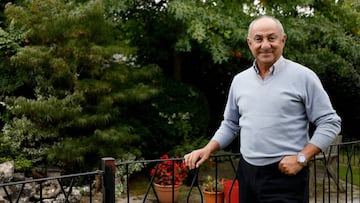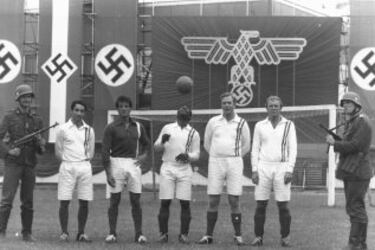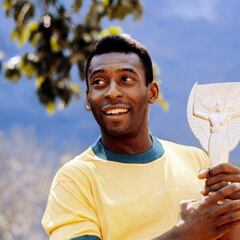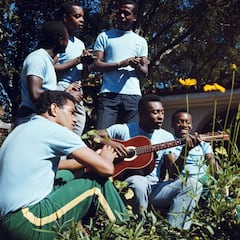Ardiles: “Pelé changed the ‘Escape to Victory’ script for Stallone”
The former Argentina player spoke to AS about Pelé and the movie, which was supposed to end with Stallone hitting the winner. Pelé changed the ending because “Sylvester didn’t even know how to catch the ball...”

Pelé's recent passing has invited us to look back over the Brazilian legend’s life and to other times - when life was very different to how it is today. Osvaldo Ardiles had the privilege of sharing a good friendship with O Rei and Maradona. He was world champion with Argentina in 1978, became an emblematic player for Tottenham in the 1980s and remains a Spurs legend. After haninging up his boots he went into coaching but is also remembered for his very brief acting career - he starred alongside Pelé, Bobby Moore and actors Michael Caine and Sylvester Stallone in the 1981 movie “Escape to Victory” - where he showed off his soccer skills. From London, where he still lives, he dusted off and opened up his memory chest for AS.
What did Pelé mean for football?
Perhaps he has been the most influential person in the entire history of the sport. With Pelé, there is a before and after he arrived on the scene. He changed so many things. For example, before he became a world star, the number that most players wanted on their shirt was No.9, the striker’s number, but then everyone wanted No.10, so that they could be like Pelé. The leader of each team or the best player went from wanting one number to another. That was one of the many aspects of the game that he transformed.
If you could choose just one memory or image of Pelé, something that defined him, what would it be?
Brazil’s fourth goal against Italy in the 1970 World Cup final in Mexico. The goal was scored by Carlos Alberto but it’s Pelé who casually lays the ball off to him. It’s almost as if time stops when he receives the ball and rolls it on perfectly just as Carlos Alberto came tearing down the wing to meet it and score a great goal.
Was he your idol when you were a child?
Yes. He seemed an extraordinary player to me. Don’t forget that Argentina won their first World Cup in 1978 and Brazil had already done so in 1958, 1962 and 1970. Thank goodness they withdrew [from Argentina 78] because if they hadn’t maybe we would still be waiting for that first title (laughs). In my country, there have been some great players but none of them reached the heights he did.
Was it normal at that time (1960s) for an Argentine child to idolize a Brazilian taking into account the football rivalry of both countries?
It wasn’t normal at all and that created serious problems for me in my environment. When Brazil were crowned champion in 1970, I openly said that this is how football should be played and that is how I would like to do it. I was criticized a lot for saying that but for me, football and playing it well were always above nationalities or rivalries.
📺 Mexico 1970 was the first #WorldCup broadcast in colour & Brazil proved why they were the best in the world 🏆
— FIFA World Cup (@FIFAWorldCup) December 18, 2020
🇧🇷 Brazil beat Italy 4-1 in the final thanks to @Pele, Gerson, Jairzinho, Carlos Alberto, Rivelino, Tostao, Clodoaldo & the list goes on...pic.twitter.com/O9P8kXWWig
Describe him as a player. What impressed you about him?
He had it all. He could played with both feet, he was very graceful, strong and quick as a gazelle - well, he was more like a black panther. He was explosive over short stretches and resilient over long ones; he wreaked havoc on rivals. What Maradona and Messi did later, he had already done before and with both feet. And all of that that playing during a much more difficult time than what modern football is like now for a talented player like him.

Of all the footballers who came after Pelé, which one was the most similar to him?
None. In my opinion there are three footballers at the top. I call them the Three Wise Men - Pelé, Maradona and Messi, each with their own style. On that Mount Olympus, there is no one else.
[Argentina coach César Luis] Menotti, who saw all the greats play, says that none reached the level that “O Rei” had, neither Maradona nor Messi. It’s strange that an Argentinean would say that, what do you think?
César is right. Pelé won three World Cups, scored over a thousand goals, changed football and what he achieved will never be repeated. In any case, opinions are generational. If you are Menotti’s age (84 years old) it is normal for you to choose Pelé, if you are mine (70) the logical thing to do is to go for Dieguito [Maradona], with whom I also played, and if you are younger, it will be Messi. All three have been gods in this sport.
The King of Kings has died. Extraordinary player. Unique. 3 times World Cup winner, more than a thousand goals. My idol when young. He made football the beautiful game and truly international. My time playing alongside him in Escape to Victory was a dream come true. RIP Pele pic.twitter.com/ovlL3rA4h5
— osvaldo ardiles (@osvaldooardiles) December 29, 2022
In a tweet after his death you said that he was the King of Kings and a unique player. What made him the greatest in your opinion?
Absolutely everything. His art, his intelligence, his physique, his aggressiveness, his reading of the game...
A 17-year-old Pele showed up at his first World Cup and did this 🤯
— FIFA World Cup (@FIFAWorldCup) December 30, 2022
Incredible 👑
As an Argentinean and a friend of both, did the tense relationship between Maradona and Pelé hurt you? Did you understand it as a battle of egos?
I don’t think it was as tense as it seemed. The press made more out of it than they should. Deep down they appreciated and admired each other. When Maradona died, Pelé said a phrase that moved me: “Let Diego wait for me in heaven because we will play together there.” It is true that sometimes there were jealousy issues - but only because they were constantly being compared and it didn’t go further. I spoke many times with Diego about this and he had enormous admiration and great respect for Pelé.
How would you imagine a game up there with both of them playing for the same team?
The first thing they will need is two balls, one for each one, but I would imagine it would be wonderful.
You might also enjoy
- Escape to Victory: The movie Pelé starred in with Sylvester Stallone
- How many goals did Pelé score in the US?
- Pelé vs Maradona: A soccer rivalry like no other
In 1981 you and Pelé starred together in the mythical film “Escape to Victory”. How long did the filming last and how did you experience it?
It was a month and a half in Budapest and we had a great time. At the end of each day’s filming, there wasn’t much to do and we dedicated ourselves to talking about football in what we called “football rounds”, which sometimes lasted until three in the morning. Obviously we all wanted to hear Pelé's stories - he told us so many anecdotes. It was a real delight.
Why were you chosen to accompany Pelé and Bobby Moore?
I was in England and met all the requirements they asked for. World champion, small and skinny. They were looking for a player who seemed almost starving because we were prisoners in a concentration camp.
Is it true that Sylvester Stallone hardly knew anything about football or that the ball was round?
In the original script it said that after saving the penalty (which by the way, I committed), he grabbed the ball, dribbled his way through the entire German side and scored the winner. Then Bobby Moore and Pelé said that this would be impossible because Sly didn’t even know how to save the ball... It was Sunday and the filming had to be finished at all costs, so the script was modified.
.@Pele tuvo su momento de grandeza en la pantalla grande con ‘Escape to Victory’. Actuó junto a Sylvester Stallone, Michael Caine, Sir Bobby Moore, Osvaldo Ardiles y el gran Max von Sydow.
— Rodolfo Landeros (@RodolfoLanderos) December 29, 2022
La vi muy pequeño y me marcó mucho este momento. [@TSting18] pic.twitter.com/2WbWWVn2O0
Related stories
What did it mean to you to be the protagonist of such a legendary film?
Apart from having a great time, the repercussion was great. I spent eight years as a coach in Japan and they only talked to me about the movie. I told them that I was world champion but they always asked me the same thing, about the film.


